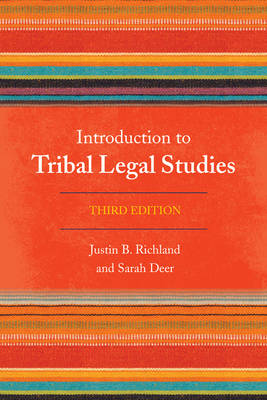
Stock image for illustration purposes only - book cover, edition or condition may vary.
Introduction to Tribal Legal Studies
Justin B. Richland
€ 100.20
FREE Delivery in Ireland
Description for Introduction to Tribal Legal Studies
Paperback. Series: Tribal Legal Studies. Num Pages: 538 pages, 6 black & white illustrations. BIC Classification: 1KBB; JFSL9; LAF. Category: (U) Tertiary Education (US: College). Dimension: 229 x 152. .
In clear and straightforward language, Justin B. Richland and Sarah Deer discuss the history and structure of tribal justice systems; the scope of criminal and civil jurisdictions; and the various means by which the integrity of tribal courts is maintained. This book is an indispensable resource for students, tribal leaders, and tribal communities interested in the complicated relationship between tribal, federal, and state law.
In clear and straightforward language, Justin B. Richland and Sarah Deer discuss the history and structure of tribal justice systems; the scope of criminal and civil jurisdictions; and the various means by which the integrity of tribal courts is maintained. This book is an indispensable resource for students, tribal leaders, and tribal communities interested in the complicated relationship between tribal, federal, and state law.
Product Details
Publisher
Rowman & Littlefield
Format
Paperback
Publication date
2015
Series
Tribal Legal Studies
Condition
New
Weight
771g
Number of Pages
536
Place of Publication
Lanham, MD, United States
ISBN
9781442232259
SKU
V9781442232259
Shipping Time
Usually ships in 15 to 20 working days
Ref
99-2
About Justin B. Richland
Justin B. Richland is associate professor in the Department of Criminology, Law, and Society at the University of California, Irvine. He is also author of Arguing with Tradition: The Language of Law in Hopi Tribal Court. Sarah Deer is a citizen of the Muscogee (Creek) Nation of Oklahoma. She is a professor of law at the William Mitchell College of Law. She is a 2014 recipient of the MacArthur Foundation's Genius Grant.
Reviews for Introduction to Tribal Legal Studies
In this updated edition, Richland and Deer have built on an already indispensable resource for those working with tribal communities. With new material throughout
including vital changes in tribal criminal jurisdiction and sentencing authority, among others - this text will undoubtedly become a `go to' resource for anyone concerned with tribal sovereignty and tribal legal institutions.
Angela R. Riley, UCLA American Indian Studies Center Introduction to Tribal Legal Studies remains an indispensable resource for students, advocates, leaders, judges, and students. The new edition provides critical materials on the way American Indian tribal justice shifted dramatically in the last few years as the United States enacted two important criminal justice statutes enhancing tribal criminal sentencing authority and authorized tribes to prosecute non-Indians for crimes against intimate partners. Inaakonigewin (Indian law) matters more now than ever, and more Indian people have a stake in their justice systems. This new edition is the handbook of tribal justice for Indian people all over.
Matthew L.M. Fletcher, associate professor of law; Director of the Indigenous Law and Policy Center, Michigan State University College of Law Richland and Deer offer a rich and up-to-date collection of the most indispensable articles and essays on tribal legal systems, together with examples of cases, statutes, and constitutions, in a format that is accessible to both law-trained and lay audiences. The third edition includes new material on tribal approaches to integrating traditional justice into modern court systems and an updated chapter on the Indian Child Welfare Act. It also covers key changes to federal laws affecting tribal criminal power. Here, the authors do more than simply summarize the changes by including a helpful discussion of how federal law affects tribal criminal courts in practice and highlighting creative strategies for working within and around jurisdictional limits.
Addie C. Rolnick, University of Nevada, Las Vegas, associate professor of law
including vital changes in tribal criminal jurisdiction and sentencing authority, among others - this text will undoubtedly become a `go to' resource for anyone concerned with tribal sovereignty and tribal legal institutions.
Angela R. Riley, UCLA American Indian Studies Center Introduction to Tribal Legal Studies remains an indispensable resource for students, advocates, leaders, judges, and students. The new edition provides critical materials on the way American Indian tribal justice shifted dramatically in the last few years as the United States enacted two important criminal justice statutes enhancing tribal criminal sentencing authority and authorized tribes to prosecute non-Indians for crimes against intimate partners. Inaakonigewin (Indian law) matters more now than ever, and more Indian people have a stake in their justice systems. This new edition is the handbook of tribal justice for Indian people all over.
Matthew L.M. Fletcher, associate professor of law; Director of the Indigenous Law and Policy Center, Michigan State University College of Law Richland and Deer offer a rich and up-to-date collection of the most indispensable articles and essays on tribal legal systems, together with examples of cases, statutes, and constitutions, in a format that is accessible to both law-trained and lay audiences. The third edition includes new material on tribal approaches to integrating traditional justice into modern court systems and an updated chapter on the Indian Child Welfare Act. It also covers key changes to federal laws affecting tribal criminal power. Here, the authors do more than simply summarize the changes by including a helpful discussion of how federal law affects tribal criminal courts in practice and highlighting creative strategies for working within and around jurisdictional limits.
Addie C. Rolnick, University of Nevada, Las Vegas, associate professor of law
